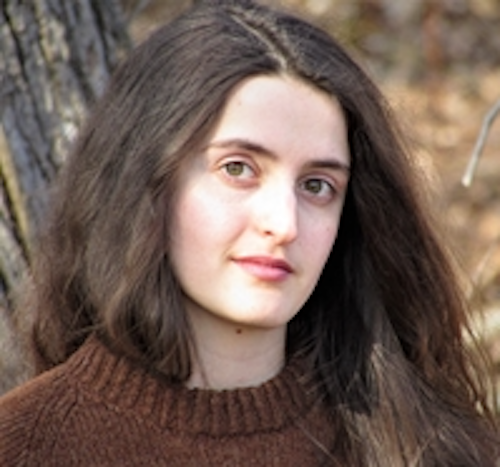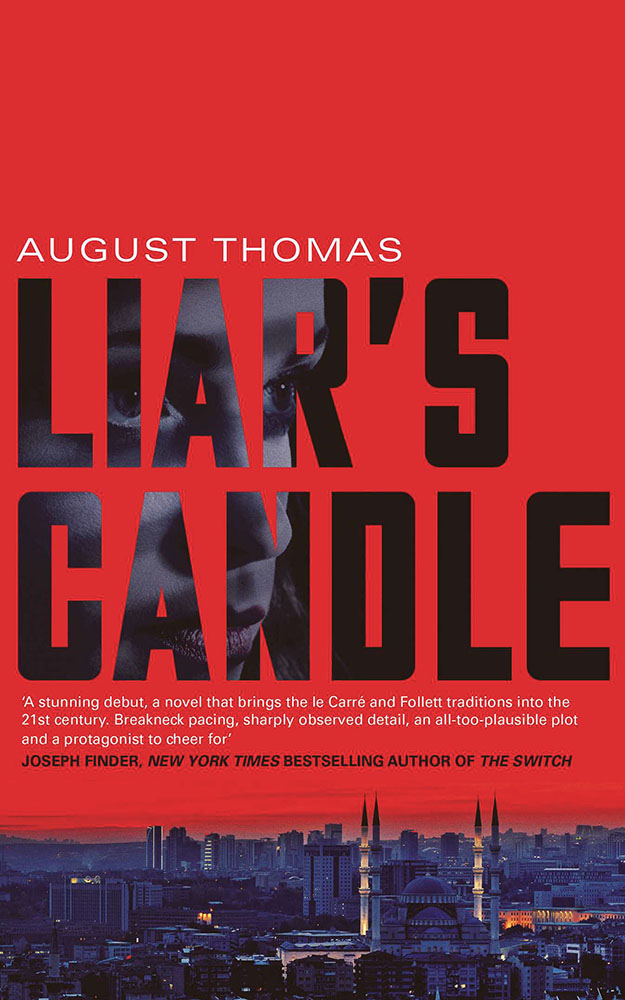Bridget Lawless talks to August Thomas
Bridget: In Liar’s Candle, you’ve created a female protagonist who finds herself in serious danger, and at times at the mercy of very powerful political forces. Yet the jeopardy is never aimed at her because she’s a woman, and never exploits ‘traditional’ threats such as rape or beatings. Was that a conscious decision?
August: Not really. Telling a gripping story always comes first, and I wouldn’t censor myself. That said, when a heroine in a thriller faces rape or beatings, those scenes are often implicitly or explicitly sexualized, or cast the woman as a powerless victim. I wanted my protagonist to be flawed but powerful — someone you’d want to go with on an adventure, not a doe-eyed victim to leer at. I did consciously decide to make Liar’s Candle feel as realistic as possible, which impacted other narrative choices. For example, one of my heroine’s antagonists is a ruthless but profoundly religious and (in her own eyes) ethical woman. How is a character like that going to conduct an interrogation? For me, it’s much more fun to write the unexpected.
Bridget: As someone who identifies as a feminist, do you feel obliged either to avoid or address violence towards women in your novels, or do you not think about it one way or another?
August: I feel a responsibility to write both men and women as fully, vividly human — and that’s it. Novels aren’t manifestos. But Liar’s Candle comes from my imagination, so of course it’s deeply informed by how I see the world. It’s feminist for the same reason it’s written in English — that’s how I think.
Bridget: When you started to write Liar’s Candle, what were your aims? What kind of novel did you intend or hope it would be?
August: I’d studied and travelled in Turkey for years, read mountains of nonfiction about diplomacy and intelligence, talked a lot with US diplomats, been inside the NSA, watched zillions of silly spy movies…and read very few thrillers. That gave me a wonderful freedom to write the story exactly as I imagined it, without feeling like I had to conform or react to any genre expectations. I wanted to write an unputdownable spy thriller with a complex and powerful young female lead. I used to work in Turkey as a travel writer, so I also wanted to show off Turkey’s fascinating culture and colorful locations– from the President’s grotesquely enormous new palace in Ankara to an ancient monastery near the Syrian border.
Bridget: You might be aware of the heated debate going on at the moment about why women are such avid readers and writers of novels in which women are cast as victims of violence and sexual assault. Why do you think women create and consume that kind of storytelling? Is that a genre of novel you read yourself? Have you deliberately avoided going in that direction in your own work?
August: I think there’s room for all kinds of storytelling. Women writers — and readers — shouldn’t have to justify what stories we enjoy any more than men do. Why we read what we read is such a complex question. I think it’s important to remember that availability is a major factor — people tend to buy books that are widely distributed and well publicized. So I think it can be problematic to try to psychoanalyze the forces behind publishing trends. When I want a suspenseful read, I personally prefer more old-fashioned whodunnits like mysteries by Agatha Christie, Ellis Peters, etc.
Bridget: Liar’s Candle is a spy novel, which is unusual ground for female writers, (and you’re surely one of the youngest.) Why do you think it’s been such a male preserve? Does that make it more attractive to you? Or do you simply think it’s a world of great stories that for some reason women haven’t much explored?
August: I don’t think being “the youngest” matters much — it’s what you do that’s important. But given how many young women write fiction, especially thrillers, I was a bit puzzled to find there weren’t more (any?) other twenty-something women publishing spy fiction right now — and relatively few women, period.
Why so few female spy novelists? I don’t know. I suspect it’s connected to broader cultural questions about whose expertise is valued. Who gets to speak with authority about power and geopolitics, about “serious things”, about the political sphere? The privilege to have your writing on these subjects taken seriously– in fiction or nonfiction — tends to skew towards people who are older, white, and male.
Publishers don’t expect mystery writers to kill people, but if you want to publish spy thrillers, real-life intelligence work gives you a major credibility boost. When women do publish spy novels, it’s often after they have “earned” the standing to tell those stories through decades of real-life intelligence work, like Stella Rimington and Valerie Plame. Perceived credibility matters, and it can impact what stories get told. My US publisher, Scribner, also publishes a series of successful spy novels, about a young female Russian sex spy who can see people’s colorful “auras”. Every chapter ends with a recipe. The (extremely talented) man who writes those is a 30-year veteran of the CIA, so he can do that. I seriously doubt I would have been allowed to, because — as a young woman with no intelligence background — I have to defend my credibility, even in the smallest details. In one rather comical case, my former editor, the man who acquired and edited Liar’s Candle, once argued with me about whether my 21-year-old female protagonist could plausibly wear her hair in braids, or own a pantsuit.
Especially in a genre that depends on surprise and suspense, it’s important not to just keep telling the same few stories. Diverse voices will help keep the spy fiction genre fresh and exciting. That means enriching what’s on offer, not taking anything away.


